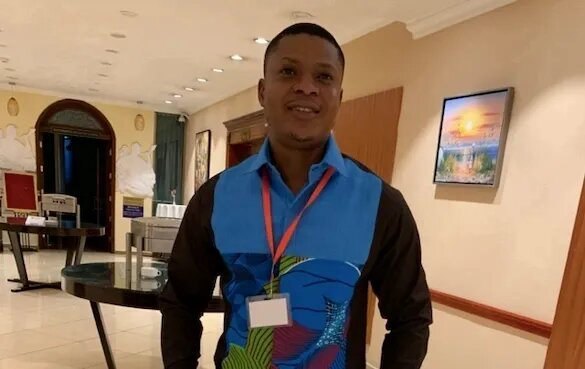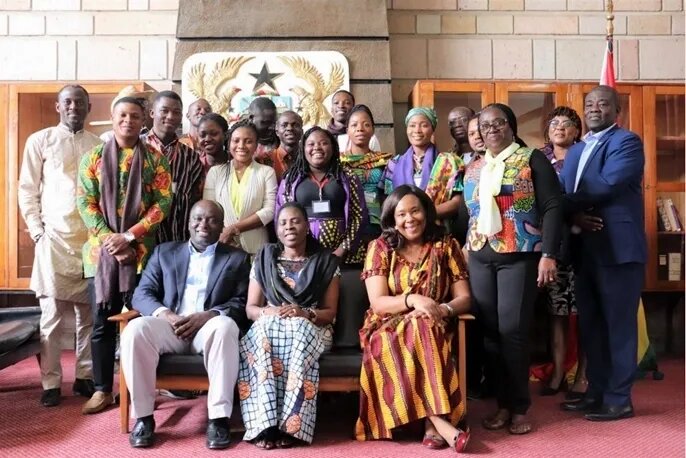A youth perspective on global health advocacy during COVID-19
This is a guest blog by Lucky Soglo, Youth Leader for Health. Lucky advocates regularly for increased domestic resources for enhanced malaria responses and health system strengthening, through his involvement in the Youth Leaders for Health programme. The blog originally appeared on the WACI Health and RESULTS UK.

I brace myself for the day ahead especially now that I mostly work from home. I have decided to spend the entire month of April getting to know what it is like to be a health worker during these times. This means I will be paying visits to various health centers in the Sekondi-Takoradi district within the Western Region of Ghana.
I step out of the house at 8:00am without getting enough sleep.
As I walk past my neighbors, I realize everyone has got a face mask on, from the market trader to the flashy banker. Wonderful. Messaging and advocacy is working here, an area where the number of COVID-19 cases is increasing steadily. Who would take a risk and do otherwise?

My first stop is at the out patients section of the Effia Nkwanta Regional Hospital, this facility serves as the referral center for the Western Region of Ghana. I meet up with the senior nursing officer on duty. She says to me,
“As hospitals fill up and more and more people get infected daily, medical staffs have to endure long hours, intensifying conditions and the looming fear of contracting the virus themselves”.
“We are at the end of our strength,” adds a doctor who came out of retirement to help at the hospital.
“We do not have sufficient resources and especially staff, because apart from everything else, the staff are beginning to get sick.”
Another nurse tells me “Rev Lucky, it’s not been easy at all, some of us, our own family members are scared to have interactions with us, our husbands are very careful when they are around us”.
You can clearly see the struggle these workers go through each day but at the same time you sense commitment and passion as they add their efforts to a national response.
The Senior Nursing Officer tells me, she will do this over and over again, given the chance. Admirable.
I respond to these comments by urging the nurse and doctor to consider malaria interventions concurrent with COVID-19 because immune systems weakened by untreated malaria will struggle more with COVID-19.
Community leaders and chiefs are key stakeholders in our fight against malaria, and so I end my visit at the hospital and decide to do a follow up visit to the traditional leader, the Chief of Apremdo, a community in the Western Region that has recorded high cases of malaria in recent years. We had met earlier in March.
As we navigate through issues regarding malaria, it’s hard not to talk about the impact of COVID-19. At the end of the encounter, I realize the head way I have made, as he sets up a meeting with the malaria focal person in the region. We talk about linkages between COVID-19, malaria and malnutrition and how as he talks to the community he should emphasize good sanitation, hygiene and proper nutrition, and so on to build wellbeing and resilience in these COVID-19 times. He assures me of complying.
It’s around 4:30pm, it’s late and I say goodbye. I feel a sense of satisfaction knowing that I can count on this traditional leader as an ally in health advocacy, community mobilization and engagement.
I glance at my watch and its 4:45pm and I head home.
Not all days are the same though with this level of success.
A week ago, when I met the Head of the Public Health Division for the region to discuss strategies to address malaria, I was informed the Public Health Unit had suspended all malaria interventions and all attention was focused on COVID-19.
Sadly this is not just a Ghana thing; it’s the current tune the entire world is singing.
In all my interaction I ensure I adhere to all the safety protocols as I ensure social distancing and also I make sure I have my nose mask on, as much as it very uncomfortable sometimes, it’s important to lead by example.
As my COVID-19 journey progresses, I am learning to act like an advocate but think like a virus….what does this mean;
- Diseases ignore borders. Borders separating countries are meaningless to diseases. While there is the urgent need to act locally there is the danger of failing globally. My voice should cross borders.
- Distractions are an opportunity to lose sight of real danger and that is what COVID-19 is teaching me. As political dis-engagements and diplomatic spats continue the virus wreaks havoc everywhere. Every minute spent on arguing and blaming is a minute wasted on finding solutions. I will try to be focused at all times.
- Nothing makes a virus happier than misinformation. Confusing and inconsistent information has characterized this pandemic. Facts, clarity and consistency of information should drive my work.
I am likely to lose more sleep in my work as a youth leader for health but I am encouraged by allies, influencers and motivators I meet along my journey including the support from Hope for Future Generations.
I will continue to follow up on visits and actions agreed.
I know what it is like to lose hope, so in my life as a health advocate, I aspire to be that thread of hope for someone else.
BE THE CHANGE YOU WISH TO SEE, I am doing my part, I hope you do too!
